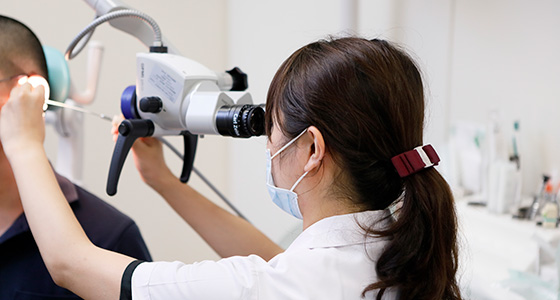- HOME
- Department
- Otorhinolaryngology – Head & Neck Surgery
Otorhinolaryngology – Head & Neck Surgery

(1) Overview
Otorhinolaryngology – Head & Neck Surgery is a clinical department that handles a wide range of diseases, from commonly known diseases such as otitis media, allergic rhinitis, and tonsillitis, to malignant and benign tumors that grow in the head and neck area. Specifically, the department treats the following diseases.
- Ear diseases: Deafness, otitis media, dizziness, etc.
- Nose diseases: Chronic sinusitis, allergic rhinitis, etc.
- Diseases of the pharynx and larynx: Tonsillitis, vocal cord polyp, etc.
- Head and neck tumor (benign, malignant)
- Sleep apnea syndrome
- Facial palsy
(2) Policy
It is known that the degree of malignancy of head and neck cancer cannot be completely determined based on appearance and imaging tests alone. For this reason, the department aims for personalized treatment cautiously proceeding with treatment based on clear scientific evidence in accordance with the characteristics and condition of the tumor.
(3) Our Strengths
Designed to alleviate the impact of surgery on patient lives
Our department is frequently referred patients requiring surgery from other medical institutions, and conducts a total of more than 200 surgeries annually. (Based on surgeries conducted in the Central Operating Room from January 1 to December 31, 2023)
When conducting surgeries that require hospitalization, we seek to shorten the duration of hospitalization. For example, for a surgery on a benign tumor in the head and neck area, in principle, patients can be discharged after approximately four nights. In addition, for nasal and paranasal surgeries, and vocal cord polyp surgery, although it depends on the case, we aim to discharge patients in as few days as possible.
The department is setup to enable patients to be admitted and discharged on weekends, and we make an effort to provide medical care that also satisfies patients who are working.
Selecting operating methods with as little burden on patients as possible
Malignant head and neck tumors include pharyngeal cancer, laryngeal cancer, nasal cavity cancer and paranasal sinus cancer, mouth cancer, salivary gland cancer, and thyroid cancer.
For relatively early laryngeal cancer, oropharyngeal cancer, and hypopharyngeal cancer, where possible, the department uses a surgical method known as transoral tumor removal. Transoral tumor removal is a surgical method where cancer lesions that conventionally required a surgical incision are resected through the mouth using an endoscope. In this way, wherever possible, the department seeks to avoid treatment that places a major physical burden on patients.
In addition, for advanced laryngeal cancer or recurrence after radiation therapy, the department selects transoral tumor removal or partial resection of the larynx if possible for cases that until now had required a total laryngectomy. By doing so, we strive to leave the patient’s voice intact.
Initiatives for safe endoscopic sinus surgery
Of those patients with chronic sinusitis (also known as empyema), if the condition does not improve with drug therapy using antibiotics or for moderate to severe cases, the department recommends surgery. In most cases, the department conducts a surgery known as endoscopic sinus surgery (ESS). ESS, which can be conducted on both sides simultaneously, has the advantage of only requiring a short period of hospitalization and little postoperative pain/swelling.
Currently, many hospitals use hi-vision format endoscopic systems, and the surgery is conducted while properly checking the patient’s nasal cavity. In order to further enhance safety, the department has installed a navigation system for all nasal and paranasal surgeries using endoscopes.
Message for Our Patients
The department treats head and neck cancer, which occurs in an area that has important roles that are indispensable for life, such as vocalizing, swallowing, and breathing. It is also an area whose appearance (aesthetically) is prone to be impacted by treatment. If cancer can be detected early, not only can the disease be cured, but also these functions can be left intact and the appearance can be maintained. We recommend that you come in for a consultation as soon as possible if you have the following symptoms.
- Hoarse voice
- Pain when swallowing
- Swollen neck
- Difficulty eating solids
- Double vision